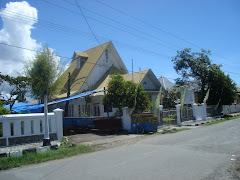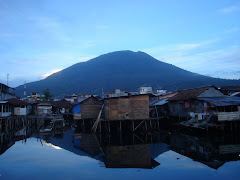Moluccas or Maluku (Indonesian language) is a cluster of about one thousand islands totaling for about 74,530 square kilometers, forming part of the Melanesian Archipelago in eastern Indonesia near New Guinea. The region is divided into two provinces, Maluku with its capital in Ambon, and North Maluku with its capital in Ternate. The islands of North Maluku Province are: Ternate (main island), Bacan, Halmahera (the largest), Morotai, Obi, Sula, and Tidore. The islands of Maluku Province are: Ambon (main island), Aru, Babar, Banda, Buru, Kai, Kisar, Leti, Seram, Tanimbar, and Wetar. Its approximately 1000 islands support a population of less than 1.7 million people. The main means transportation is air and sea, which link the islands together.
Most of the islands are mountainous, some with active volcanoes, and enjoy a wet climate. The vegetation of the small and narrow islands, encompassed by the sea, is very luxuriant; including rainforests, sago, rice, and the famous spices--nutmeg, cloves and mace, among others.
Kamis, 31 Juli 2008
Why it called The Spice Islands?
This islands are rich with many kinds of plant, and the most famous are clove (cengkeh) and nutmeg (pala). Europeans searched many years before finally finding the Spice Islands in the late l5th century. Before, their aromatic treasure, which was worth its weight in gold in l5th and 16th century Europe, was only obtainable through trade with Arabian. Today, the cengkeh (clove), which was originally endemic to the North Moluccas, has achieved new significance due to the popularity of kretek cigarettes, as well as to its use in pharmaceutics.
Kretek cigarettes is very recognizable because of its special, strong smell. Clove trees require very little care - keeping the area around the tree free of weeds promotes growth and simplifies the bi-annual process of gathering the harvest of fallen buds. Cloves, which are harvested late, are marketed as lower-quality, less-aromatic pulong. It takes eight to ten years before a clove sapling blossoms for the first time. A mature tree yields approximately five to six kilograms of buds/11-13 lbs. On Ambon and Ternate, model boats, houses and other constructions are built entirely out of cloves; this craft dates back to the last century. The tourist with a toothache will be glad to know that sucking on a few whole cloves brings relief. Dentists, too, are aware of the pain-killing properties of clove oil.
The nutmeg (pala) tree is also very easy to grow. Five years after being planted, the young tree bears fruit for the first time, but not until twenty years later does it reach its normal level of production. Then, it will continue bearing fruit for up to eighty years. The pala nuts, whose green peach-like shells are also used, can be harvested all year round. It is the pit of this fruit that is the actual nutmeg; its fibrous covering is mace. The white color of whole nutmeg comes from a calcium solution that was first used during colonial times to render them unfit for use as seed. Only later was it discovered that this calcium layer did not impede germination, but rather, that it kept the nutmeg fresher longer. In the 17th and 18th centuries, the price of nutmeg was much higher in England than it was on the European continent. Ladies wore them as fragrance in gold or silver lockets around their necks; gentlemen spiced their grogs with nutmeg which they carried around with them in a small box complete with a grater.
Kretek cigarettes is very recognizable because of its special, strong smell. Clove trees require very little care - keeping the area around the tree free of weeds promotes growth and simplifies the bi-annual process of gathering the harvest of fallen buds. Cloves, which are harvested late, are marketed as lower-quality, less-aromatic pulong. It takes eight to ten years before a clove sapling blossoms for the first time. A mature tree yields approximately five to six kilograms of buds/11-13 lbs. On Ambon and Ternate, model boats, houses and other constructions are built entirely out of cloves; this craft dates back to the last century. The tourist with a toothache will be glad to know that sucking on a few whole cloves brings relief. Dentists, too, are aware of the pain-killing properties of clove oil.
The nutmeg (pala) tree is also very easy to grow. Five years after being planted, the young tree bears fruit for the first time, but not until twenty years later does it reach its normal level of production. Then, it will continue bearing fruit for up to eighty years. The pala nuts, whose green peach-like shells are also used, can be harvested all year round. It is the pit of this fruit that is the actual nutmeg; its fibrous covering is mace. The white color of whole nutmeg comes from a calcium solution that was first used during colonial times to render them unfit for use as seed. Only later was it discovered that this calcium layer did not impede germination, but rather, that it kept the nutmeg fresher longer. In the 17th and 18th centuries, the price of nutmeg was much higher in England than it was on the European continent. Ladies wore them as fragrance in gold or silver lockets around their necks; gentlemen spiced their grogs with nutmeg which they carried around with them in a small box complete with a grater.
Republic of South Moluccas (RMS)
The South Moluccas (Republik Maluku Selatan, RMS) attempted to secede with the declaration of a single republic of Indonesia in 1950 to replace the federal state,. This movement was led by Chris Soumokil (former Supreme Prosecutor of the Eastern Indonesia state) and supported by the Moluccan members of the Netherlands special troops. This movement was defeated by the Indonesian army after 17 years of bloody struggle and by special agreement with the Netherlands the troops were transferred to the Netherlands. During the visit to Ambon of the Indonesian president in the summer of 2007, RMS sympathisers disturbed ceremonies by performing the Mollucan war dance and hoisting the RMS flag. But don’t worry, this movement has no power anymore, so you can enjoy this island in very condusive situation
Langganan:
Postingan (Atom)




.jpg)
.jpg)

